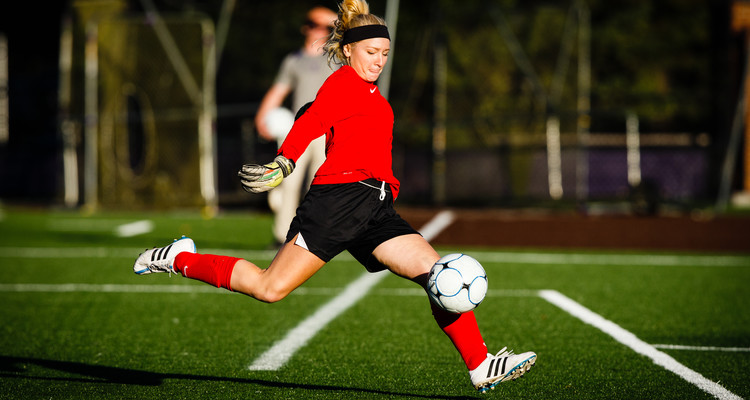College athletes always are looking for an edge, which can lead to any number of seemingly strange, out-there practices for finding how to perform best. At the University of St. Thomas, athletes and coaches have turned more and more to perhaps the most obvious, yet underappreciated, element of athletic preparation: the health benefits of sleep.
“So often, sleep isn’t something we focus on; it’s last on our minds at the end of the day,” said women’s soccer goalie senior Tarynn Theilig, who finished last season with the best save percentage in Division III and has twice been named the conference’s defensive player of the year. “It really shouldn’t be. Sleep is amazing.”
Theilig is one of many athlete sleep converts of psychology associate professor Roxanne Prichard, who – along with director Birdie Cunningham – helps run the St. Thomas Center for College Sleep. The center researches and promotes the health benefits of good sleep habits for college students, and has found “the detrimental effect of poor sleep on GPA is on par with marijuana use and binge drinking.”
With academic performance at a premium for individuals, it’s perhaps no surprise that the benefits of sleep to athletic performance started to draw some attention at St. Thomas, too. About five years ago Prichard began connecting with athletic teams, and in the time since has provided dozens of presentations and specific guidance on training schedules based around healthy sleep habits.
“When the coaches ... see how many detailed and specific questions their players have about sleep and they see how far off their own thinking has been about sleep, it’s pretty interesting,” Prichard said. “[Coaches] will ask, ‘Which night is the important night for sleep? The night before a game or two nights before?’ It’s like, ‘No, no, it’s continued sufficient sleep that’s important.’”
Theilig took a class with Prichard and had to log her sleep habits for a month, which made her more aware of what differences in sleep did to her waking hours.
“It really helped everything,” she said. “I started scheduling my sleep first, eight hours set aside, so it’s, ‘What can I do with that time to practice, have class, eat, do homework?’ That just helps you reorganize your life and prioritize where you want to put focus.”
An increased focus on sleep showed its benefits early and often to Theilig, who soon made it part of her job as a team captain to hold her teammates accountable too.
“It’s something that’s so easy to fix. You can’t force your teammates or the players to go get eight hours, but you can monitor it,” she said. “One example was when we played UW-Whitewater last season, people were tired and asking if we could nap on the way before the game. … Half the team napped and we ended up losing, played terrible, and afterward that stuck and people saw the difference when they didn’t have as much sleep. That actually helped.”
Naps are actually one of the biggest sleeping misnomers for students in general, Prichard said.
“A nap should be 30 minutes. Longer than that can make it harder for you to sleep at night and your sleep won’t be as restorative,” she said.
The center has created a more accessible digital version of the College Sleep Questionnaire – the standard measurement tool for gathering information about sleep from college students – and is developing a program that provides feedback and information about helpful resources on campus. (The program is being tested currently at several universities across the country, Prichard said.)
For athletes in particular, that kind of feedback and assistance off the field has coincided with positive results, even if the correlations are kind of “squishy.”
“What can you say for sure [about connecting it to athletic performance]? The first year we presented to the men’s soccer team they made it to the NCAA semifinals. Coincidence? I don’t know,” said Prichard with a smile.
Theilig, for one, is sold.
“It’s amazing. I love sleep. Learning more [about its benefits] has been great,” she said, adding that she had a job with the St. Thomas Wellness Center last summer as a sleep indicator and is helping with the April sleep challenge. “If I’m not getting enough sleep I feel it so drastically. People don’t realize it unless they change it. Once you get those eight hours you’ll be hooked on how much you need and want to get it.”







